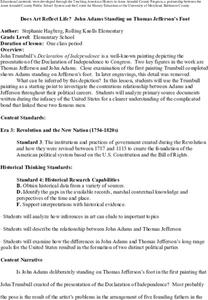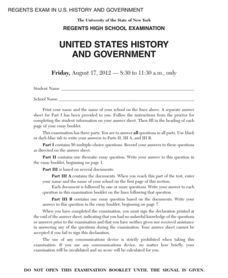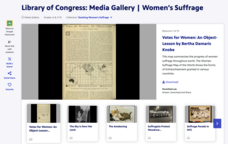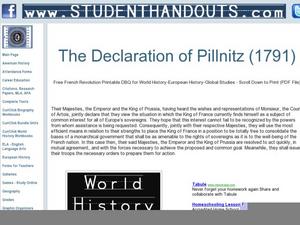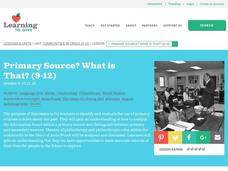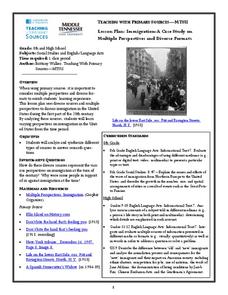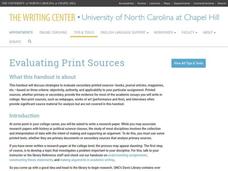DocsTeach
The Settlement of the American West
What do Abraham Lincoln and the Transcontinental Railroad have in common? Using a set of primary source documents, including pictures, maps, and treaties, class members link together the common themes of expansion into the American West....
Center for History Education
Why is John Adams Standing on Thomas Jefferson's Foot?
Was it a bromance, or were they frenemies? Young historians use a controversial portrait and letters between Thomas Jefferson, John Adams, and others to evaluate the relationship between the two Founding Fathers. Examining the primary...
New York State Education Department
US History and Government Examination: August 2012
Just how far can the American government go during war time? With primary source documents, learners consider the effects on restrictions of freedom of speech, the detention of American citizens of Japanese descent, and the Patriot Act...
PBS
Library of Congress: Media Gallery | Women's Suffrage
Designed to support a study of women's suffrage in the United States, a primary source document set from the Library of Congress includes images, song sheets, articles, statistical documents, political cartoon, and audio recordings...
American Battlefield Trust
1862: Antietam and Emancipation
The Emancipation Proclamation shifted the tone and purpose of the Civil War. Using a primary source analysis, pupils consider the significance of the document. A second activity investigates the founding of the United States Colored...
New York State Education Department
Global History and Geography Examination: January 2015
Looking for some ways to practice primary source analysis or multiple-choice strategies with your scholars? Check out a helpful standardized test. Multiple-choice questions based on primary sources, a writing prompt about human and...
American Battlefield Trust
1864-1865: Bringing the War to an End
The Civil War—in its breathtaking ferocity—came to a close in 1864. However, turmoil echoed throughout the country's politics, including the presidential context between Lincoln and McClellan. Performing chronology and primary source...
Curated OER
Little House in the Census: Almanzo and Laura Ingalls Wilder
How would you use census data from 1880-1900? Here are a set of ways you can incorporate the book Little House on the Prairie and US census data from that time period. Learners will research the validity or the book based on factual...
Curated OER
The Declaration of Pillnitz (1791)
Primary source documents are wonderful because they provide a real context for historical events. Here is an expert from The Declaration of Pillnitz (1791) for your readers to examine. They consider the passage then use it to answer...
Center for History Education
Methods of Reform: The Lowell Mill Girls
Although the girls and women who worked in the Lowell Mills are not often seen this way, they are the forbearers of the American labor movement. Pupils examine primary sources, including testimony about life at Lowell and labor laws, as...
Council for Economic Education
Business in the Middle Ages: Working in a Guild
Long before modern labor unions, guilds worked to ensure that workers had a fair wage. But, in medieval Europe, they also cooperated with the government. Using a simulation and primary source analysis, young scholars become hatters in...
Humanities Texas
Primary Source Worksheet: General Washington, Letter Declaring Acceptance of the Command of the Armies of the United States
Discover what influenced president George Washington's decision in his early career to command the United States army by analyzing his formal acceptance with this primary source analysis worksheet.
Humanities Texas
Primary Source Worksheet: Frederick Douglass, “Expression of Gratitude for Freedom”
Here is a fantastic primary source analysis activity regarding Frederick Douglass' speech delivered at the unveiling of the Freedmen's Monument in 1876. The follow-up discussion questions and activities highlight Douglass' discussion of...
US National Archives
WWII: Western Europe 1939-45 – Invasion
Without the benefit of history, Western Europe in the 1940's had no idea what was about to befall them. Class members use primary sources, including political cartoons, videos, and internal documents, to analyze how much of a threat...
Urbana School District
Knocking Down Fences
After reading The Other Side and guiding children through a picture walk, third graders investigate evidence of the civil rights movement. In the mini unit, 3rd graders analyze photographs of the past and make connections between...
Curated OER
Primary Source? What is That?
High schoolers examine the use of primary sources. They read and discuss excerpts from the "Diary of Anne Frank," write journal entries, identify examples of altruism from the book, write an essay, and complete a worksheet.
Curated OER
Slavery in the United States: Primary Sources and the Historical Record Lesson
Students analyze primary source documents to determine how life was for slaves. In this slavery lesson, students view online resources from the Library of Congress to analyze and discuss. Students select a final object to analyze and...
Curated OER
Using Primary Sources in the Classroom: Slavery Unit Lesson 1: Slave Code of 1833
High schoolers explore the concept of slavery. In this primary research lesson, students read the Alabama Slave Code of 1833 and discuss its implications. High schoolers also examine emancipation-related documents and respond to...
Middle Tennessee State University
Lesson Plan: Immigration: A Case Study on Multiple Perspectives and Diverse Formats
As part of a case study of U.S. immigration during the first part of the 20th century, class members examine a variety of primary sources that present multiple perspectives of the responses of those in favor of immigration and those...
University of North Carolina
Evaluating Print Sources
Not all sources are created equal, so how do you evaluate them? Writers learn how to evaluate print sources based on elements such as audience, tone, and argument in the sixth handout of 24 in the Writing the Paper series from the...
New York State Education Department
US History and Government Examination: January 2011
The presidencies of John F. Kennedy, Richard Nixon, and Ronald Reagan were defined by the Cold War. Using primary source documents and scaffolded analysis questions, pupils explore the effect the Cold War had on these presidencies. A...
Newseum
Today's Front Pages
Take a close look at a number of newspapers with collection of lessons and activities. Using a poster (which can be found under the materials tab), learners examine the hard copy of a local newspaper. This leads into an exploration of...
DocsTeach
Prequel to Independence
It's about time! Young historians use primary sources to create a timeline of events leading to American Independence. The fast-paced activity is designed to be used at the end of a unit on the Revolutionary War or as an assessment tool....
New York State Education Department
US History and Government Examination: August 2011
Using primary source documents, pupils consider how the United States' democratic story has evolved over time. A second essay question examines the role of geography in history, and multiple-choice questions sharpen test-taking skills.



